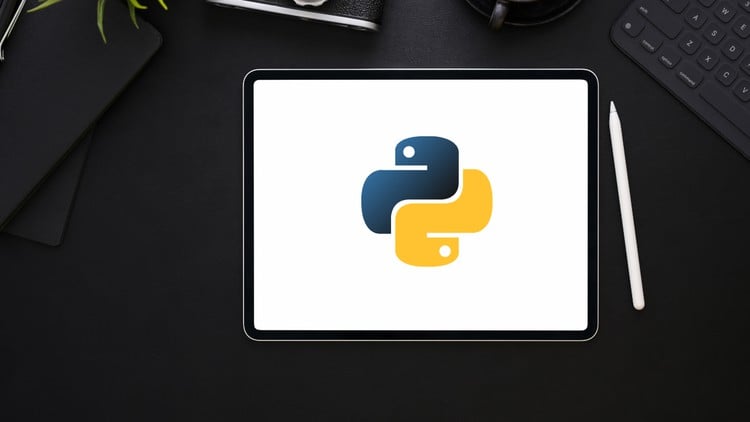
This course is a depth introduction to fundamental python programming concepts by demonstrations in Python programming .
⏱️ Length: 5.5 total hours
⭐ 4.33/5 rating
👥 213,326 students
🔄 September 2020 update
Add-On Information:
Note➛ Make sure your 𝐔𝐝𝐞𝐦𝐲 cart has only this course you're going to enroll it now, Remove all other courses from the 𝐔𝐝𝐞𝐦𝐲 cart before Enrolling!
- Course Overview
- Explore Python’s foundational elements through an immersive, demonstration-centric approach.
- Understand the practical application of programming concepts beyond theoretical definitions.
- Experience a structured learning path designed for absolute beginners to Python programming.
- Grasp core Python syntax and semantics through clear, live coding examples.
- Discover how Python handles various data types and operations interactively.
- Learn the importance of modularity and code organization through practical function demonstrations.
- Uncover the logic behind conditional and iterative statements in various scenarios.
- Witness the step-by-step execution of Python scripts, demystifying complex processes.
- Gain an intuitive understanding of program flow and decision-making structures.
- Prepare for further advanced Python topics by solidifying fundamental principles.
- Build a strong conceptual framework for general-purpose programming using Python.
- Get accustomed to the Python interpreter and basic development environment interactions.
- Understand the role of comments, whitespace, and code readability in practical development.
- Examine various common error types and basic debugging strategies through demonstrations.
- Learn about Python’s powerful built-in functions and their practical applications.
- Requirements / Prerequisites
- Basic Computer Literacy: Familiarity with operating a computer and navigating file systems.
- Stable Internet Connection: Essential for accessing course materials and Python resources.
- Enthusiasm for Learning: A genuine interest in understanding how programming works.
- No Prior Programming Experience: This course is specifically designed for absolute beginners.
- Text Editor/IDE Access: Willingness to install and use a basic code editor like VS Code or IDLE.
- Commitment to Practice: Readiness to actively follow along and reinforce learning with personal coding.
- Skills Covered / Tools Used
- Foundational Python Syntax: Mastery of basic language constructs like assignments and operators.
- Interpreting Python Code: Ability to understand and predict basic script behavior.
- Basic Scripting Logic: Developing simple programs to automate fundamental tasks.
- Data Manipulation Fundamentals: Working with numbers, strings, booleans, and basic collections.
- Algorithmic Thinking (Introductory): Approaching problems with a structured, step-by-step mindset.
- Problem Decomposition: Breaking down larger challenges into smaller, manageable parts.
- Interactive Development: Using the Python interpreter for quick tests and exploration.
- Code Structuring Basics: Understanding how to organize code effectively within functions.
- Debugging Principles (Introductory): Identifying and resolving simple syntax and logical errors.
- Using Python Standard Library (Basic): Leveraging common built-in modules and functions.
- Command Line Interface (Basic): Running Python scripts from the terminal environment.
- Computational Thinking: Applying abstract thought to solve computational problems.
- Logical Reasoning: Developing conditional statements and loops for decision-making.
- Variables and Memory Management (Conceptual): How data is stored and referenced in Python.
- Python 3 Environment Setup: Practical knowledge of setting up a basic Python workspace.
- Benefits / Outcomes
- Solid Programming Foundation: Establish a strong base for learning any other programming language.
- Enhanced Problem-Solving Capabilities: Develop a systematic approach to technical challenges.
- Increased Confidence in Coding: Feel comfortable writing and understanding basic Python scripts.
- Path to Automation: Begin automating repetitive tasks in your daily work or personal projects.
- Gateway to Data Science/Web Development: Acquire entry-level skills for specialized Python fields.
- Career Advancement Potential: Open doors to entry-level programming roles or enhance existing ones.
- Improved Digital Literacy: Gain a deeper understanding of how software works and interacts.
- Empowerment for Personal Projects: Start building small applications or utilities of your own design.
- Effective Code Comprehension: Become proficient in reading and interpreting others’ Python code.
- Future Learning Readiness: Be well-prepared to tackle intermediate and advanced Python topics.
- Cost-Effective Learning: Access quality education from a highly-rated and widely-taken course.
- Practical Skill Acquisition: Focus on hands-on application rather than abstract theory.
- Independent Learning: Develop the ability to self-teach and explore Python further.
- Analytical Skill Development: Cultivate a more analytical and logical mindset.
- Quick Start to Development: Rapidly move from zero knowledge to basic functional code.
- PROS
- High Student Engagement: Over 213,000 students have enrolled, indicating broad appeal and effectiveness.
- Strong Rating: A 4.33/5 rating suggests high student satisfaction with the course quality and content.
- Demonstration-Led Learning: The emphasis on live coding makes complex concepts easier to grasp.
- Concise and Focused: A 5.5-hour duration is ideal for quickly acquiring foundational skills without being overwhelming.
- Excellent Value for Beginners: Provides a comprehensive entry point into Python without prior experience.
- Updated Content: Recent update (September 2020) ensures modern best practices are covered.
- CONS
- Limited Depth: As an introductory course, it may not cover advanced topics or complex project applications, requiring further learning for specialized roles.
Learning Tracks: English,Development,Programming Languages
Found It Free? Share It Fast!